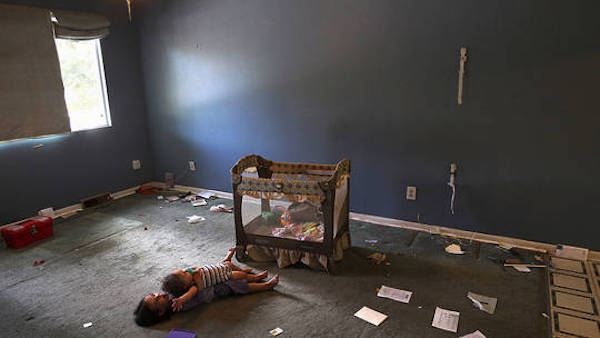
Toddlers born during the pandemic scored lower on some skills development tests than those born earlier. © Getty Images / John Moore
Researchers found infants born into a Covid-impacted environment scored lower on skills development tests than pre-pandemic babies
Babies born in the wake of the Covid-19 pandemic may have experienced delayed motor and social skills development compared to those born earlier, according to new research that suggests stress on pregnant mothers played a part.
The study, published on Tuesday in the JAMA Pediatrics journal, screened the social, communications, problem-solving and motor skills of 255 infants born between March and December 2020 in New York City, the early epicenter of the US pandemic.
In most areas, they had slightly lower average scores than babies born prior to the pandemic, irrespective of whether their mothers had contracted Covid-19 during pregnancy.
Using a standard evaluation tool given to parents, known as the ‘Ages and Stages Questionnaire,í the researchers from Columbia University Irving Medical Center analyzed aspects of infant development at six months, including their ability to roll onto their stomach and how often they babble.
Roughly half the mothers studied had Covid at some point during pregnancy - with most experiencing mild symptoms or asymptomatic. While no differences were found in the scores of babies who were exposed to coronavirus in the womb and those who were not, both groups scored lower on social and motor skills than some 62 pre-pandemic infants.
On top of this, the researchers found that infants whose mothers were in their first trimester of pregnancy at the height of the pandemic showed the lowest neurodevelopment scores. There were, however, no dips in other measured areas, such as communication or problem-solving skills.
While noting that the results were not "large differences" and not indicative of long-term development lags, lead author Dani Dumitriu said the scores "warrant careful attention" since they could have a "significant public health impact" if the same held true at a "population level."
The results suggest the huge amount of stress felt by pregnant mothers during these unprecedented times may have played a role.
Although the study did not measure maternal stress during pregnancy, Dumitriu told NBC News that the infants were likely affected by being born into an environment of lockdowns and other pandemic-exacerbated stressors on families, such as unemployment or homelessness.
However, other factors, including the reduced likelihood of play dates and interacting with stressed caregivers, could also explain the drop in social and motor skills, the researchers said.
LINK: https://www.ansarpress.com/english/25730
TAGS:






























 British coronavirus vaccine: Human trials to include 10,000
British coronavirus vaccine: Human trials to include 10,000




